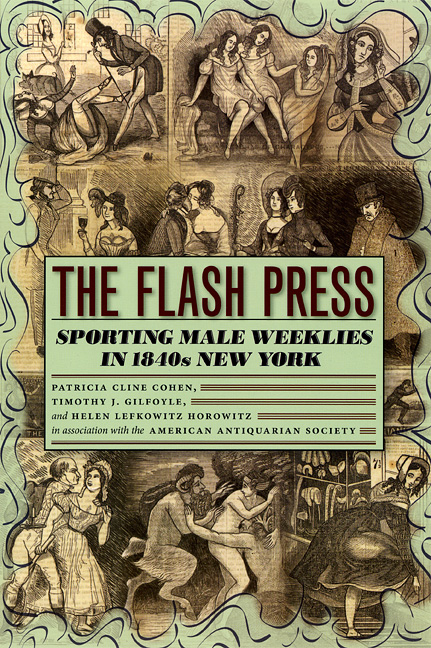A map to the seamy corners of New York City

In last Saturday’s edition of the Daily Telegraph Robert Douglas-Fairhurst reviewed The Flash Press: Sporting Male Weeklies in 1840s New York. In his review Douglas-Fairhurst gives a short overview of the social and historical significance of the “flash” papers—the nineteenth-century weeklies that covered and publicized New York City’s extensive sexual underworld—touching on their appeal to readers in the UK and taking an amusing jab at one of the Telegraph‘s competitors:
“Flash” newspapers offered a titillating guide to the pleasures of urban life that had hitherto been spoken of only in hushed whispers: brothels, pornography, dog fights, playhouses, bare-knuckle boxing and more.
Crammed into a handful of closely printed pages was up-to-date gossip, sexual scandal, handy tips on how to avoid picking up a prostitute with a glass eye (the key, it seemed, was to avoid women wearing veils), and blustering attacks on anyone, such as immigrants or “sodomites”, who might have threatened the developing group identity of these cocky young men about town.
By 1842, four rival publications in New York “squawked in competition” for their custom. Adventurous readers could use the Flash, the Whip, the Rake or the Libertine as a map to the seamy corners of a city that was often described, with pride and alarm, as “a modern Sodom.…”
The engagingly written introduction to this anthology argues plausibly that the flash press was the last occasion on which mainstream American journalism tried to titillate as well as entertain its readers.
For a British reader, the spectacle of writing that smacks its lips over the vices it claims to be disgusted by will seem far more familiar. It comes as no surprise, therefore, to discover that many of the most salacious stories printed in the flash press were taken from newspapers originally published in London.
Still, it is a nice historical coincidence that two of the New York papers from which the flash press evolved were called the Star and the Sun, just as it is fun to learn that one of the editors also started up a “frothy weekly with literary pretensions called the Sunday Times.”
Read the full review on the Telegraph website.
Also read an excerpt from the book.